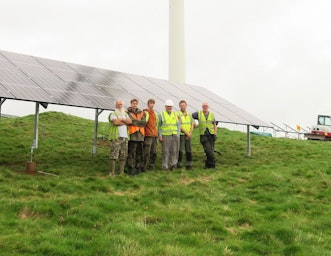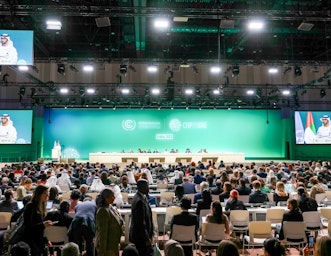
Earlier this week Paul Allen got back from the UN climate talks in Madrid (COP25). Here, he shares his thoughts on how it went and what we need to start doing in preparation for the UN climate talks next year in Glasgow (COP26).
COP25 finally ended 44 hours over schedule! Apart from breaking the world record for the longest COP in history, its outcomes were at best mixed.
I was moved by the incredibly up-lifting swell of enthusiastic ambition from youth, from scientists, from delegates and from a growing coalition of countries who are committed to closing the gap between what current pledges offer and what the science of a climate emergency demands. To get to grips with the scale and speed of increased ambition needed to bridge this gap, I suggest you have a look at the following:
www.unep-wcmc.org/news/2019-emissions-gap-report
climateactiontracker.org/global/cat-emissions-gaps
climateactiontracker.org/global/cat-thermometer/
Delivering a stable future climate for everyone on earth now depends on what happens in the run up to, and during COP26 in Glasgow, as many of the Paris Agreement commitments begin in 2021. We all hoped the final discussions on the rules that govern this would be settled during COP25 in Madrid, but sadly, despite the record over-run, this was not fully the case. But better to have a late decision than a bad decision.
Most rules needed for the Paris Agreement were agreed last year at COP24, including the guidelines for each ‘nationally determined contribution’ (offer of what each country will do), but little progress was made for the remaining rules. In particular this includes the rules for ‘Article 6’ covering international transfer of greenhouse gas allowances. This will govern how actions in ‘Country A’ can be used to fulfil a climate target of ‘Country B’.
From my observations at the event, and from the analysis by INFORSE made after I had to head back to Wales; Brazil, Australia and a few other countries wanted weak rules for example, to allow use of old allowances generated via the Kyoto Protocol. Fortunately, a group of both developing and industrialised countries lead by Costa Rica stood firm on strict rules, to avoid undermining the credibility of the Paris Agreement. Known as the ‘Unconventional Group’, this coalition is currently formed of Costa Rica, Switzerland, Belize, Colombia, Paraguay, Peru, Marshall Islands, Vanuatu, Luxembourg, Cook Islands, Germany, Sweden, Denmark, Austria, Grenada, Estonia, New Zealand, Spain and Ireland. Hopes are this group will grow during 2020 in the run up to Glasgow.
The Unconventional Group have been working since the Pre-COP25 in San José, Costa Rica, to increase the level of ambition in talks dealing with carbon markets. They have agreed on a set of principles, known as the San Jose Principles for High Ambition and Integrity in International Carbon Markets, that constitute the basis upon which a fair and robust carbon market should be built.
Regarding the negotiations on how countries finance the transition, most countries welcomed the progress in achieving the target of $100 billion per year from 2020 in climate assistance from industrialised countries (even though many agreed it could have much been better) and everyone agreed to take stock of the progress at COP26.
Quite reasonably, many call COP25 a failure, as large countries including USA, Brazil and Australia were reluctant to take climate action – in many ways a reflection of the current political situation. But often the real results are made between the COPs.
COP25 did achieve some positive outcomes, including the adoption of a 5-year Gender Action Plan and the inclusion of programs for land and oceans. COP25 gave space to many amazing voices, showing real commitment to delivering the ambition needs, and it allowed me to share CAT’s new Zero Carbon Britain work across borders, and to find lots of new innovative work from countries around the world.
Many thanks to INFORSE to all your support and collaboration.
But the reality is, we have an awful lot of work to do in the run up to COP26 in Glasgow….
- Zero Carbon Britain
- Climate Change
Related Topics
Related Pages
Related news


Scaling up climate action in your community
12th February 2024
COP28 – critical steps, but much further to go before we reach safer ground
18th December 2023








